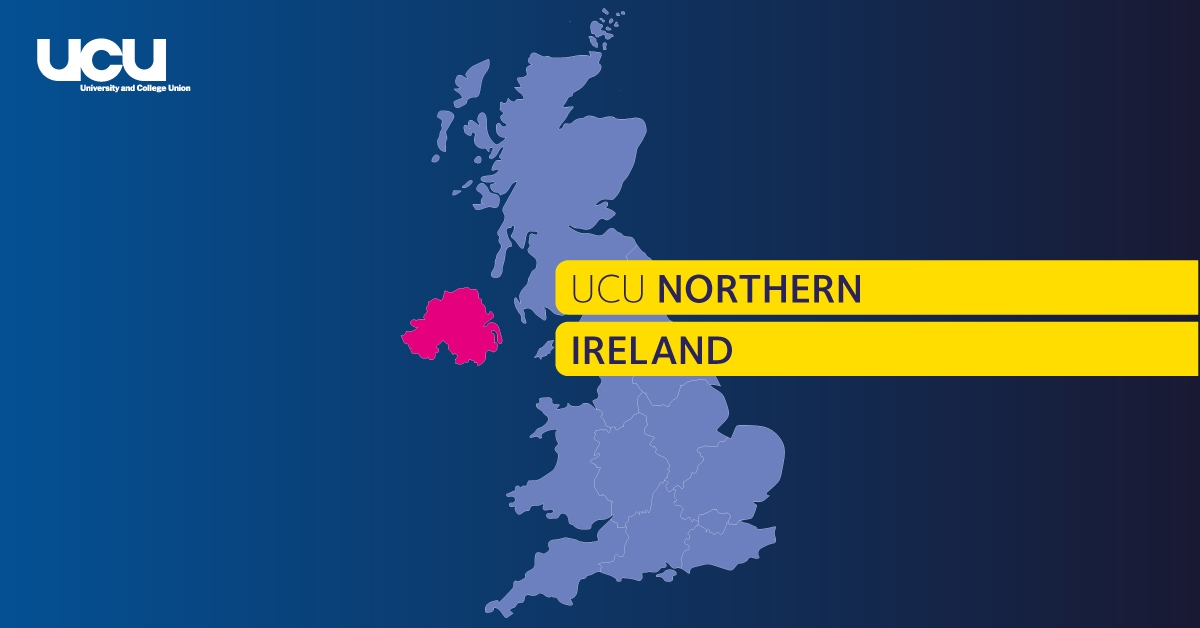Northern Ireland bottom of UK tables for educational and employment success
1 December 2009
UCU takes campaign to Stormont to put education back on the agenda and NI on the front foot
Northern Ireland is bottom of UK tables that measure employment rates and people with qualifications, according to new analysis released today by UCU.
Just over two-thirds of people in Northern Ireland (69.7%) are employed, the worst percentage of the UK's 12 regions. The South East of England tops the table with over three-quarters of people (78.5%) employed. The average is 74%.
Northern Ireland is the region with the highest percentage of people without qualifications. One in five (21.8%) people have no qualifications, which is a long way off the national average of 12.4%. Northern Ireland fares slightly better when it comes to the percentage of people with a degree though. Over a quarter of people (25.7%) have a degree, which puts Northern Ireland in the middle of the regions' table but still some way behind the average of 29%.
UCU is today launching its nationwide Make Education Count campaign with events at Stormont, Holyrood, Westminster and Cardiff. The union has written to all 108 MLAs in Northern Ireland seeking their support for campaign and will be taking the 'Make Education Count' message to the Assembly's Employment & Learning Committee.
This will be followed by a lobbying event at Stormont in January - when constituency profiles for educational attainment will be presented to local politicians.
UCU Northern Ireland Regional Official, Jim McKeown, said: 'UCU's Make Education Count campaign is about equality and access to education. It examines each constituency to highlight how where you live can still impact on educational achievement, life chances and gaining fulfilling employment.
'UCU wants to work closely with MPs and MLAs across Northern Ireland's 18 constituencies to improve educational opportunities for people of all ages and backgrounds. Make Education Count will enable UCU to indicate to elected representatives where marked inequalities in educational attainment exist - and how this is reflected in various other demographic indicators.'
Employment and education levels by region
Region | % employed | % with at least degree or equivalent | % with no qualifications |
North East | 70.8 | 23.9 | 13.4 |
North West | 71.3 | 25.6 | 14.7 |
Yorks & Humber | 73.0 | 25.0 | 13.4 |
East Midlands | 75.9 | 25.4 | 13.2 |
West Midlands | 71.7 | 24.5 | 16.0 |
East | 77.2 | 26.1 | 11.8 |
London | 70.4 | 38.6 | 12.0 |
South East | 78.5 | 31.5 | 8.9 |
South West | 78.3 | 28.3 | 9.0 |
Wales | 70.7 | 26.5 | 14.1 |
Scotland | 75.6 | 33.8 | 12.5 |
Northern Ireland | 69.7 | 25.7 | 21.8 |
National average | 29.0 | 12.4 |
SOURCES: Association of Colleges, Universities UK, Revisiting the Benefits of HE, J Bynner et al, Bedford Group for Lifecourse and Statistical Studies, The Institute of Education (IoE), 2003
Employment and education levels by constituency in Northern Ireland
Parliamentary Constituency | % with at least degree or equivalent | % with qualifications below degree level | % with no qualifications | % employed |
Belfast East | 39% | 49% | 12% | 81.8% |
Belfast North | 21% | 48% | 31% | 59.2% |
Belfast South | 50% | 39% | 11% | 75.3% |
Belfast West | * | 57% | 32% | 57.1% |
East Antrim | 28% | 59% | 13% | 68.6% |
East Londonderry | 18% | 54% | 29% | 64.4% |
Fermanagh South Tyrone | 23% | 48% | 28% | 71.7% |
Foyle | 22% | 51% | 27% | 59.4% |
Lagan Valley | 32% | 49% | 20% | 72.6% |
Mid Ulster | 18% | 46% | 36% | 62.8% |
Newry & Armagh | 22% | 50% | 28% | 64.6% |
North Antrim | 22% | 52% | 26% | 74.4% |
North Down | 28% | 62% | * | 74.7% |
South Antrim | 30% | 56% | 14% | 79.2% |
South Down | 28% | 54% | 18% | 71.8% |
Strangford | 22% | 56% | 22% | 73.2% |
Upper Bann | 25% | 54% | 21% | 75.0% |
West Tyrone | 21% | 51% | 28% | 59.8% |
NI | 26% | 52% | 22% | 69.7% |
Source: Northern Ireland Labour Force Survey Local Area Database 2008
The Ulster Teachers Union (UTU) and Irish National Teachers Union (INTO) have also pledged their support and commitment to UCU's Make Education Count campaign.
- PrintPrint this page
- Share




Comments